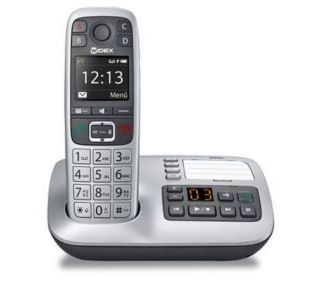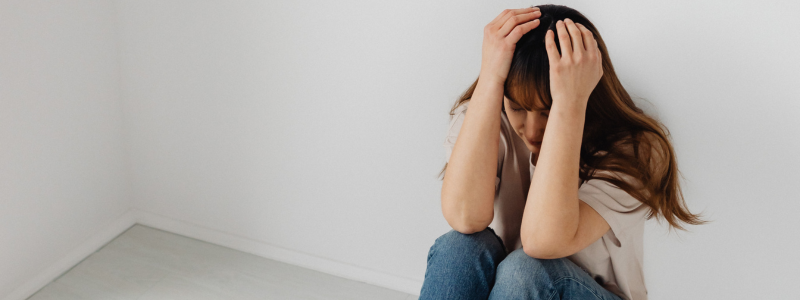
Head of Online Medical Content

Audiology Expert

Best Phone for Hard of Hearing and Best Telephones for Hard of Hearing
Researching different types of telephones for the hard of hearing?
What are phones for the hard of hearing? | Examples of Phones for Hard of Hearing Mobiles | Best mobiles and best house phones | Consider your options | Signs to look out for
Last Hearing Aid UK Update:
What are phones for the hard of hearing?
Phones for the hard of hearing are designed to help individuals who experience hearing loss communicate over the phone more easily.
These phones are designed with a wide variety of features to enhance things such as hearing aid compatibility, visual indicators, amplification and many more.
In this article, we will cover the characteristics and elements of hard for hearing phones and how they can benefit you depending on your unique hearing challenges.
Continue reading to find out what hard of hearing phone best suits your needs, allowing you to be able to communicate with family and loved ones without any issues.
There are various hard-of-hearing phones available
In today's market, there are various styles of phones for the hard of hearing, and the choice you make is often dictated by your specifications, like your level of hearing loss and even level of sight.
They range from basic devices to premium phones that will cost you more but offer more features that will assist and improve your communication with loved ones.
Most hearing aids that we supply can also have a matching landline phone produced by the same manufacturer, which will help to provide the most effective hearing possible for you on the phone.
Modern-day phones for the hard of hearing
The phones for the hard of hearing have come a long way, and now they work very similarly to hearing aids in regard to filtering unwanted background noise, so words are clearer.
Modern hard of hearing phones cater to varying levels of hearing loss and can really improve the quality of your communication and lifestyle.
However, if you have a more severe loss, you will probably need one that offers a larger dB volume so you can successfully communicate.
Widex PHONE DEX Hard of Hearing Cordless Phone
A great example of a cordless phone would be the Widex PHONE DEX - a telephone for the hard of hearing, as seen in the image below. This type of telephone is designed for people with hearing loss. You can pair it with your hearing aids or use it as a conventional phone as well.
While landline phones for hearing loss don't offer the freedom of smartphones, they do offer additional features like very loud ringtones and lights that indicate an incoming call.
Telephones for the hard of hearing, like this one, provide you with excellent speech understanding in both ears.
Key features of this particular model include:
- Range - Around 300 metres
- Contacts - 50 numbers
- Standby - 100 hours
- Call-time battery - 10 hours

Landline phones for the hard of hearing
Here are a few more specifics to consider when choosing a cordless phone for hearing loss:
- Can you control the volume?
- Does it include incoming call indicators like a flashing light or vibrations?
- Does it have a speech-to-text/caption feature/screen?
- Can you text from the phone as well, or use a typewriter?
Examples of Phones for Hard of Hearing Mobiles
What is the Doro phone? We have a lot of queries about the best phones for the hard of hearing and dexterity. We thought it might be beneficial to talk a little bit about the Doro mobile, as it is such a great example, and patients have liked the simplicity of the technology.
The Doro phone is a user-friendly mobile phone that appeals to those who are hard of hearing, have trouble with dexterity, or vision impairment and is ideal for the older generation who are active.
They are designed and created with seniors in mind, with a louder sound, large buttons, separated keys and digital hearing aid compatibility.
The Doro phone's main priority is to make life easier for the elderly generation, giving them and the ones they love peace of mind.
However, they also appeal to all ages as they are great for those who have difficulty with sight. Bigger buttons also allow for a simpler solution for communicating.
What’s so different about the Doro mobile phones for the hard of hearing and difficulty with sight?
- Large button mobile phone.
- Fall alerts.
- GPS integration – So family members can locate you if needed.
- SOS button – You can contact your family and friends in case of an emergency.
- Remote Assistance – For mobile phone assistance, directly, like adjusting your phone settings.
- Responder smartphone app – For all additional features.
- Easy to set up.
- Bluetooth connectivity (in some models).
What type of phone is the Doro?
These mobiles offer the Android smartphone experience combined with an easy-to-use interface, built-in assistance and extra security safety features.
They started off with a lack of the innovative features you’d get with today’s smartphone, like touchscreen displays and high-res cameras, but they are what they are and provide a device that is great for calls and texts for active seniors.
The Doro mobile phones of today
Now Doro offers simple smartphones that give consumers the best of both, so you can now benefit from some smartphone features in a user-friendly package, making Doro phones a popular simple mobile phone brand.
How much do Doro phones cost?
In today’s market, Doro phones can cost from around £25 to £180 – it all depends on what you want and what you need your mobile phone for.
For instance, if you want to link hearing aids, you might be limited on what model you can go for, as not all will be compatible with all hearing aids and, more importantly, the devices you are currently wearing.

Best Phone for Hard of Hearing and Telephones for Hard of Hearing
Doro Phones for Active Seniors
Here are some of the current Doro mobile phones available on the market:
| Doro 1370 mobile phone | Doro 730X mobile phone |
| Doro 7010 mobile phone | Doro 6040 mobile phone | Doro 1360 mobile phone |
| Doro 6824 mobile phone | Doro 7000H mobile phone | Doro 2404 mobile phone |
| Doro 6620 mobile phone | Doro 7080 mobile phone | Doro 5516 mobile phone |
| Doro 6060 mobile phone | Doro 780X mobile phone | Doro 5860 mobile phone |
| Doro 5860 mobile phone | Doro 6820 mobile phone | Doro 6880 mobile phone |
Is a Doro mobile phone worth it?
At the end of the day, like with a lot of technology, you have to weigh it all up. What do you want from your phone? What do you need it for? Do you find using modern smartphones difficult?
It is important to remember that sometimes cheaper smartphones have numerous features that are tricky to use due to being a lower-specification option.
The best thing to do is visit a mobile phone store and have a look at their Doro phone options, as well as compare them to a cheaper smartphone alternative.
Then ask a member of staff to go through some of the main features you’d use every day and see if the Doro phone is right for you.
Best mobiles and best house phones for hard of hearing brands
Here are some more examples of the main phone brands that are ideal for those who are hard of hearing. They include some of the features of the Doro phone as well as powerful voice and ringer volume, big buttons and adjustable options. Other hard of hearing phone brands include:
- Geemarc
- Emporia
- Swissvoice
- Amplicomms
- Ornin
- Alcatel

Best Phone for Hard of Hearing
Hearing aids, hearing loss & smartphones
What if I'm a hearing aid wearer and looking for the best phone for the hard of hearing?
If you are a hearing aid wearer and are thinking about purchasing a smartphone like the Doro mobile phone, speak to your audiologist as you’ll need to double-check check your hearing aids are compatible with said device.
Or failing that, what hearing aids are compatible with each Doro model?
Consider your options
When looking for a phone for the hard of hearing, there are various specifics to consider. Her,e we look into what options are available and which might be better for you. To make it easier, we have broken guidance into hearing loss levels.
Best phone for hard of hearing - Mild to moderate hearing loss
If you have this level of hearing loss, which is usually age-related, you might not need to do anything in particular when using your mobile phone with your devices. Your hearing aid microphones will just pick up the sound from the phone.
That being said, you are more than likely going to get some degree of background noise here.
Best phone for hard of hearing - Profound hearing loss
If you have this kind of severe hearing loss and frequently use your mobile, you would naturally desire clear speech and sound. We would recommend wearing hearing aids that include Bluetooth for that extra boost and a telecoil feature.
Hearing aids, which include telecoil, can direct sound to the device's processing technology without the need for a microphone. It also offers a much-improved signal-to-noise ratio, as well as reducing feedback.
Hearing Aids and Smartphone Bluetooth Connectivity - Hearing aids and iPhone and Android compatibility
From experience, many of our patients who have hearing loss and wear hearing aids opt to use their smartphones to communicate every day at home and on the go rather than purchasing a phone specifically for the hard of hearing.
They connect and pair their iPhone or Android mobiles (as well as other wireless devices) to their hearing aids and stream calls, audio and much more via Bluetooth technology.
They can also manage their hearing aid devices by boosting their hearing in a challenging environment or adjusting settings and volume. They generally have a cordless phone for the hard of hearing at home for landline calls.
All modern hearing aids have Bluetooth and offer premium connectivity and connection to loved ones.
Key takeaways
- Phones for the hard of hearing feature enhanced amplification, hearing aid compatibility, visual call indicators (flashing lights), loud ringtones, large buttons, and background noise filtering to improve communication for those with hearing loss.
- Popular options include cordless landline phones like the Widex PHONE DEX (which pairs with hearing aids) and Doro mobile phones designed for seniors with features like large buttons, fall alerts, GPS integration, SOS buttons, and hearing aid compatibility. Doro phones range from £25 to £180 depending on features.
- Other recommended brands for hard of hearing phones include Geemarc, Emporia, Swissvoice, Amplicomms, Ornin, and Alcatel, all offering similar accessibility features.
- For mild to moderate hearing loss, standard phones may work with hearing aids, picking up sound through microphones. For profound hearing loss, Bluetooth-enabled hearing aids with telecoil features are recommended for clearer speech and improved signal-to-noise ratio.
- Many hearing aid wearers prefer connecting their existing smartphones (iPhone or Android) to their hearing aids via Bluetooth to stream calls and audio, while keeping a cordless landline phone at home. All modern hearing aids offer Bluetooth connectivity.
- Always consult your audiologist to ensure compatibility between your hearing aids and your chosen phone model before purchasing.
We are here to support you and your hearing healthcare, and we can also put you in touch with your local audiologist, who can then advise you on the best phones for hard-of-hearing individuals in your consultation.
Why Choose Us?
- FREE Hearing Tests
- Best Hearing Aids and Prices
- FREE Aftercare for Life
- FREE Home Visits
- 200+ Local Audiologists
- 60 Day Money Back Guarantee
Need more support?
Phones have become invaluable tools for people with hearing loss. They offer features like telecoil compatibility, which directly connects to hearing aids for clearer sound. Amplified phones boost volume and reduce background noise, while visual caller ID and vibration alerts ensure no missed calls.
We are here to support you and your hearing healthcare and we can also put you in touch with your local audiologist who can then advise you on the best phones for hard of hearing in your consultation.
You can also call one of our experts free on 0800 567 7621 for any advice about hearing healthcare and hearing solutions. Alternatively, fill out the contact form further down the page and we will contact you as soon as we can.
Hearing loss awareness articles you might like...
 Hearing aid stigma
Hearing aid stigma  The impact of diet on your hearing
The impact of diet on your hearing  How to tell if hearing loss is permanent or temporary
How to tell if hearing loss is permanent or temporary Our specialist service includes:
Do not spend hundreds of pounds without getting a second opinion from us.
Please call us on 0800 567 7621
 Not only are the prices great, but the service is fantastic! Many thanks to your team.
Not only are the prices great, but the service is fantastic! Many thanks to your team.What's included in our hearing aid prices?
Common FAQs when researching hearing aids and hearing loss
In general, any audiologist will always recommend to you the hearing aid model that best suits your needs. Here is a useful checklist to make sure that is the case.
- Audiologist's level of knowledge: The audiologist you have seen will hopefully have a wide knowledge of all available hearing aids; however, some will only be familiar with a small number of brands and, therefore, may not really be in a position to know which model is the best for you. It is OK to challenge their recommendation and ask them to justify why this particular brand is the one for you.
- Do research: Read about the hearing aid that was recommended. Does it seem like it will suit your lifestyle? Does it have more or fewer features than you need?
- Be aware of sales targets: Many high street retailers have specific tie-ins to a particular manufacturer/brand. The hearing aid they have suggested may still be the correct one for you, but do your research so that you know why they might have recommended it.
If you have significant hearing loss in both ears, you should be wearing two hearing aids. Here are the audiological reasons why:
Localisation: The brain decodes information from both ears and compares and contrasts them. By analysing the minuscule time delays as well as the difference in the loudness of each sound reaching the ears, the person is able to accurately locate a sound source.
Simply put, if you have better hearing on one side than the other, you can't accurately tell what direction sounds are coming from.
Less amplification is required: A phenomenon known as “binaural summation” means that the hearing aids can be set at a lower and more natural volume setting than if you wore only one hearing aid.
Head shadow effect: High frequencies, the part of your hearing that gives clarity and meaning to speech sounds, cannot bend around your head. Only low frequencies can. Therefore, if someone is talking on your unaided side, you are likely to hear that they are speaking, but be unable to tell what they have said.
Noise reduction: The brain has its own built-in noise reduction, which is only really effective when it is receiving information from both ears. If only one ear is aided, even with the best hearing aid in the world, it will be difficult for you to hear in background noise as your brain is trying to retain all of the sounds (including background noise) rather than filtering them out.
Sound quality: We are designed to hear in stereo. Only hearing from one side sounds a lot less natural to us.
Fancy some further reading on this topic? You can read about why two hearing aids are better than one in our article, hearing aids for Both Ears, here
For most people, the main benefit of a rechargeable hearing aid is simple convenience. We are used to plugging in our phones and other devices overnight for them to charge up. Here are some other pros and cons:
For anybody with poor dexterity or issues with their fingers, having a rechargeable aid makes a huge difference, as normal hearing aid batteries are quite small and some people find them fiddly to change.
One downside is that if you forget to charge your hearing aid, then it is a problem that can't be instantly fixed. For most, a 30-minute charge will get you at least two or three hours of hearing, but if you are the type of person who is likely to forget to plug them in regularly, then you're probably better off with standard batteries.
Rechargeable aids are also a little bit bigger and are only available in Behind-the-Ear models.
Finally, just like with a mobile phone, the amount of charge you get on day one is not going to be the same as you get a few years down the line. Be sure to ask what the policy is with the manufacturer's warranty when it comes to replacing the battery.
For most people, the answer is yes. But it's never that simple.
The majority of hearing problems affect the high frequencies a lot more than the low ones. Therefore, open fitting hearing aids sound a lot more natural and ones that block your ears up can make your own voice sound like you are talking with your head in a bucket. Therefore, in-ear aids tend to be less natural.
However, the true answer is we can't tell until we have had a look in your ears to assess the size of your ear canal, and until we have tested your hearing to see which frequencies are being affected.
People with wider ear canals tend to have more flexibility, also there are open fitting modular CIC hearing aids now that do not block your ears.
There is also the age-old rule to consider, that a hearing aid will not help you if it's sat in the drawer gathering dust. If the only hearing aid you would be happy wearing is one that people can't see, then that's what you should get.
Most people can adapt to any type of hearing aid, as long as they know what to expect. Have an honest conversation with your audiologist as to what your needs are.
Generally speaking, six or more. Unless it's none at all. The number of channels a hearing aid has is often a simplistic way an audiologist will use to explain why one hearing aid is better than another, but channels are complex, and it is really not that straightforward. Here are some reasons why:
Hearing aids amplify sounds of different frequencies by different amounts. Most people have lost more high frequencies than low, and therefore need more amplification in the high frequencies. The range of sounds you hear is split into frequency bands or channels, and the hearing aids are set to provide the right amount of hearing at each frequency level.
Less than six channels, and this cannot be done with much accuracy, so six is the magic number. However, a six-channel aid is typically very basic with few other features and is suitable only for hearing a single speaker in a quiet room. The number of channels is not what you should be looking at; it's more the rest of the technology that comes with them.
As a final note, different manufacturers have different approaches. One method is not necessarily better than any other. For example, some manufacturers have as many as 64 channels in their top aids. Most tend to have between 17 and 20. One manufacturer has no channels at all.
Manufacturer's warranties typically last between 2-5 years, depending on the brand and model, and cover defects in materials and workmanship. This includes repairs for component failures, electronic malfunctions, and manufacturing defects, but excludes damage from misuse, accidents, or normal wear. Most manufacturers also include loss and damage insurance for the first year.
We handle all warranty claims on your behalf, liaising with manufacturers and ensuring you get replacement devices quickly when needed. This comprehensive warranty coverage, combined with our lifetime aftercare, gives you complete peace of mind.
Our hearing tests are completely free, whether at our clinics or in your home. Unlike other providers who charge £30-£100 for home visits, we believe hearing healthcare should be accessible without financial barriers. Our comprehensive assessments include examination by a registered audiologist, audiogram results, and personalised recommendations.
All testing, future adjustments, and ongoing support are included at no extra cost. While NHS tests are also free, typical 6-week waiting periods often lead people to seek immediate private testing. We provide prompt, professional assessments that fit your schedule and budget.
Yes, we offer completely free home visits throughout the UK, and this service is included in our prices with no additional charges. Home visits are particularly valuable for people with mobility issues, busy schedules, or those who simply prefer the comfort and convenience of their own environment.
Our audiologists can conduct full hearing tests, fit hearing aids, and provide ongoing support in your home. This service sets us apart from many providers who either don't offer home visits or charge extra for them.
We can offer prices up to 40% lower than high street retailers because of our business model. As a network of 200+ independent audiologists, we don't have the massive overheads of large retail chains - no expensive high street premises, no sales targets pushing audiologists to sell the most expensive options, and no costly marketing campaigns.
However, we maintain the same buying power as the big chains because we purchase on behalf of our entire nationwide network. This means you get access to the same premium hearing aids with professional service, but at genuinely competitive prices.
We offer a comprehensive 60-day money-back guarantee, which gives you twice the industry standard time to properly assess whether your hearing aids are right for you. This extended period recognises that adjusting to hearing aids takes time, and your brain needs several weeks to adapt to the amplified sounds.
Unlike many providers who offer just 30 days, we believe 60 days gives you the confidence to test your hearing aids in all the situations that matter to you - from quiet conversations at home to busy restaurants and outdoor activities.
Other pages you might find useful
Ask the Experts
6 Morton Lane
Walkwood
Redditch
Worcestershire
B97 5QA
Latest Launch
When we refer to a product as 'Latest Launch', we mean it is the latest to be released on the market.
New
When we refer to a product as 'New', we mean that the product is the newest hearing aid model on the market.
When we refer to a product as 'Superseded', we mean that there is a newer range available which replaces and improves on this product.
Older Model
When we refer to a product as an 'Older Model', we mean that it is has been superseded by at least two more recent hearing aid ranges.
